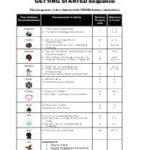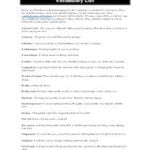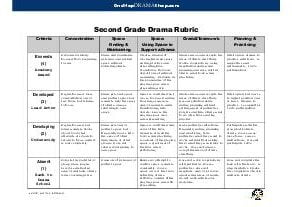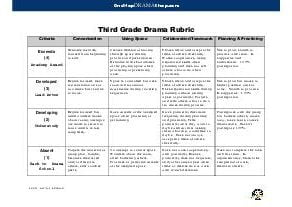2nd Grade Rubrics & Assessments-2nd Grade Rubrics
$4.00
Integration Ideas:
Concepts/Skills Taught:
Room Arrangements:
Description
Frequency Rating Scale
Informal Assessments
2nd Grade Rubrics
2nd Grade Rubrics in student language
Final Drama Assessment
Performance Assessment
Measuring student achievement in drama requires a combination of written and performance-based assessment. On this page, there are a variety of tools (PDF downloads) for use throughout the school year to assess student learning and the effectiveness of instruction. These tools were designed to support the Second Grade Curriculum. Below is a brief description of each tool.
- Frequency Rating Scale: This tool can be used for teacher feedback (to evaluate the effectiveness of lesson delivery) or as a student self-assessment. It might need to be read aloud to the students as they mark the circle they think best describes their work.
- Informal Assessments: This chapter includes five Drama Review worksheets to check student knowledge throughout the second grade year. Each worksheet has a lesson number after which you might distribute the worksheet. Generally, they are recommended for use after the knowledge being assessed has been both taught and reviewed. You may need to read the questions for your students or modify them to meet your students’ needs.
- Getting Started with Drama Rubrics: The rubrics were created to address the basic skills taught in the second grade curriculum. I use selected components of this rubric regularly, both in the classroom and in teacher workshops. You will find a teacher rubric and a sister rubric written in student language. Give students only those parts of the rubric that you cover in a given lesson. You might want to create additional rubrics and a student record sheet for documenting student progress.
- Final Drama Assessment: This paper and pencil assessment measures knowledge that students should be able to identify and define by the end of second grade. You may need to read the questions to your students, which is fine. Or you might use this as a guide to create a final assessment most appropriate for the needs of your class.
- Performance Assessment: Of course, in drama it is not enough to measure knowledge and skills with paper and pencil. This sample performance assessment breaks down the process into simple steps and includes detailed instructions for the assessor. The assessment indicators can be measured using the Getting Started with Drama Rubric. Again, you might want to create a record sheet to document student scores. As a final note, the use of a video camera can be very helpful with this type of assessment. It will allow you time to go back to evaluate and score individual student work.
CURRICULUM

Second Grade Drama Objectives Drama Objectives Alignment to National Standards These objectives cover essential learning in the art form for seven- to eight-year-old students. This first PDF download above contains objectives used in our Second Grade Curriculum (also listed below) in a handy ...

Recommended Lesson Sequence for Second Grade Purchase Lesson Sequence Outline only
Purchase or download individual lessons below The lessons suggested for our Second Grade Curriculum are put in a recommended delivery order below, but you may revise, rearrange, and adapt ...
Purchase or download individual lessons below The lessons suggested for our Second Grade Curriculum are put in a recommended delivery order below, but you may revise, rearrange, and adapt ...

Frequency Rating ScaleInformal AssessmentsFinal Drama AssessmentPerformance Assessment 2nd Grade Rubrics2nd Grade Rubrics in student languageMeasuring student achievement in drama requires a combination of written and performance-based assessment. On this page, there are a variety of tools (PDF downloads) for use throughout the ...

Vocabulary for the Second Grade This PDF document contains definitions in student language for the vocabulary words listed in each lesson. These classroom-tested definitions are used when introducing these concepts in the classroom. Of course, many of the words here may have additional ...



